
Join us as more than 350,000 spring blooms show off their flower power. Peak bloom typically happens around mid-May, and it started just in time for Mother’s Day this year. We should see our tulips last through the third week of May, pending weather.
Our spring flowers are about two weeks ahead of schedule! Be prepared if we hit peak bloom a bit earlier in May.
Early April: snowdrops, dwarf irises, Lenten roses, and more
Mid-April to Early May: early daffodils, windflowers, and various perennials
Early May: more daffodils, magnolias, hyacinths, fritillaria, and early tulips
Mid-May: Peak bloom! Various tulips, magnolias, daffodils, and perennials
Mid-May to End of May: Final days! Tulips, bleeding hearts, Adirondack crabapple tree blossoms, irises, and more
Ultimately, nature decides when flowers bloom so check back for the latest!
Don’t forget to follow us on Facebook and Instagram for even more inspirational scenes from the Garden.
Winter in Wisconsin means hibernation time for many of our perennials. Return next spring for more flower power or plan a trip to the Garden for some time outdoors in a beautiful winter wonderland.
Don’t forget to follow us on Facebook and Instagram for even more inspirational scenes from the Garden.
As the snow recedes in early spring, the warmth of March and April reawaken the bulbs of the Garden. Even as the trees remain barren, the Garden fills with the breathtaking colors of winter aconite, crocuses, daffodils, magnolias, and so much more!
Spring bulbs, magnolias (peak), daffodils (peak)
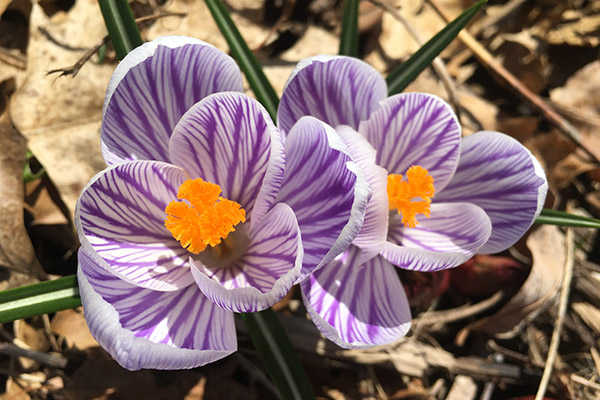

Pickwick crocus, Crocus vernus ‘Pickwick’
Crocuses are a part of the iris family, so it makes sense that they’re one of the first blooms on the scene. With large blooms, delicate purple stripes, and contrasting orange details, the Pickwick crocus is a clear winner!
Ann Little Girl magnolia
In early spring, the magnolia’s put on a stunning show of fragrant flowers. The Garden has 146 magnolias, and is recognized as a Magnolia Multisite Collection™, the only Plant Collections Network (PCN) collection in the state of Wisconsin. Many of our cultivars represent the work of local magnolia hybridizer, Dennis Ledvina, whose efforts bred magnolias with unique features that can handle our colder spring seasons and bloom longer throughout May and early June.
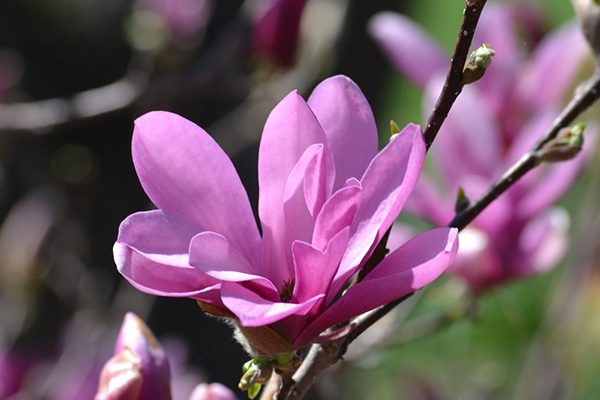

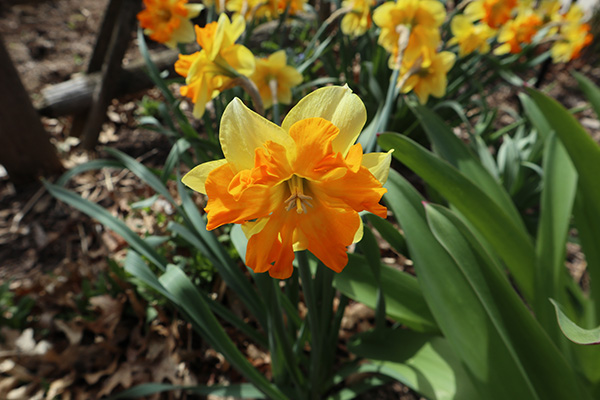

Tiritomba split-cupped daffodil, Narcissus ‘Tiritomba’
Daffodils are a fan favorite, and they’re all around the Garden in spring. While we have more varieties than you can count, there are actually over 25,000 named cultivars!
Riding the momentum of early spring blooms, May is when the Garden really comes to life. With lilacs, tree peonies, and hundreds of thousands of bulbs, there’s something to see in every corner of the Garden!
Spring bulbs, magnolias (peak), daffodils (peak), tulips (peak), viburnums (peak), crabapples (peak), lilacs (peak), hawthorns (peak), tree peonies (peak), perennials, annuals
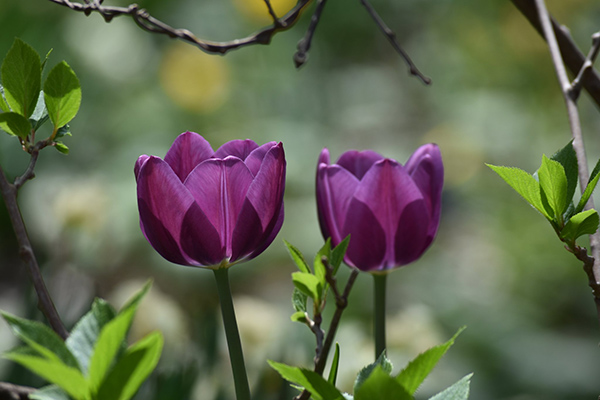

Wellspring™ tulip blend
Each tulip only blooms for 3-7 days, but the thousands of bulbs the Horticulture Team plants last us for several weeks! While tulips come in a whole spectrum of colors, the Wellspring™ tulip blend is the perfect mix of bold reds, luscious pinks, and deep purples.
Moonglow flowering crabapple, Malus ‘Moonglow’
Crabapples are one of the ancestors of your perfect grocery store cultivated apple, and while you wouldn’t get it from the name, they have beautiful delicate blossoms! The blooms also have a sweet fragrance so if you see one nearby, get close to experience the pleasant scent.
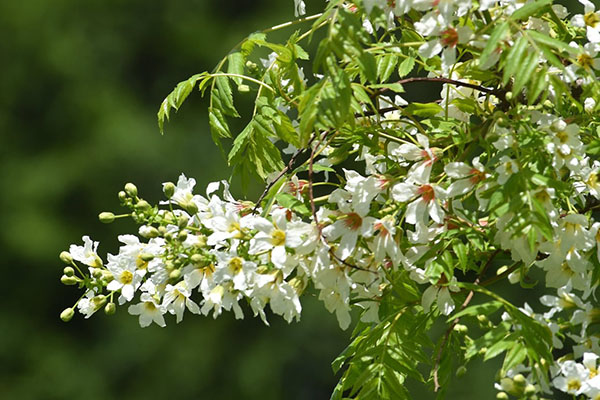

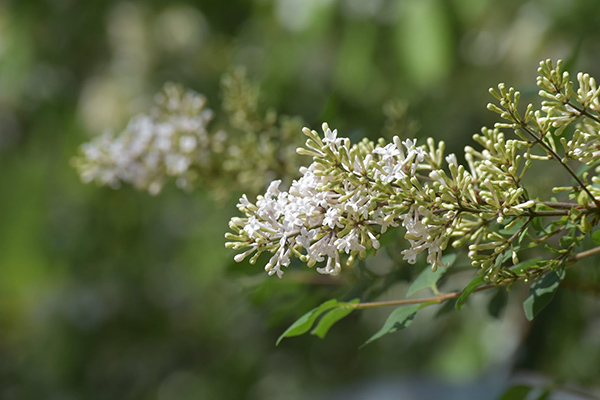

Korean lilac
In spring, lilacs look like they’re nearly engulfed by their sweet-smelling blooms! What you may not know is that they’re actually part of the olive family, and while the flowers are edible, they may not pair well with your cheese board.
Leda hybrid tree peony
Tree peonies are a woody shrub, but you wouldn’t guess it from their enormous showy flowers. They’re much more robust than their herbaceous relatives, so they’re ready to bloom pretty early in spring!
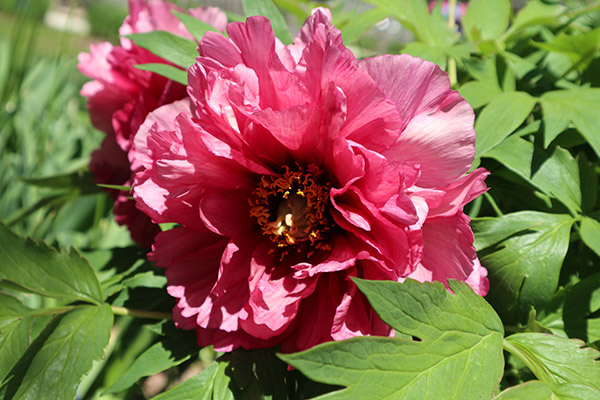

As summer begins, the Garden overflows with newly planted annuals, showy rose blossoms, and stunning herbaceous peonies. It seems like every day a new flower is on display!
Spring bulbs, viburnums (peak), crabapples (peak), lilacs (peak), hawthorns (peak), tree peonies (peak), irises (peak), herbaceous peonies (peak), delphiniums (peak), lilies (peak), phlox (peak), roses (peak), perennials (peak), annuals (peak)
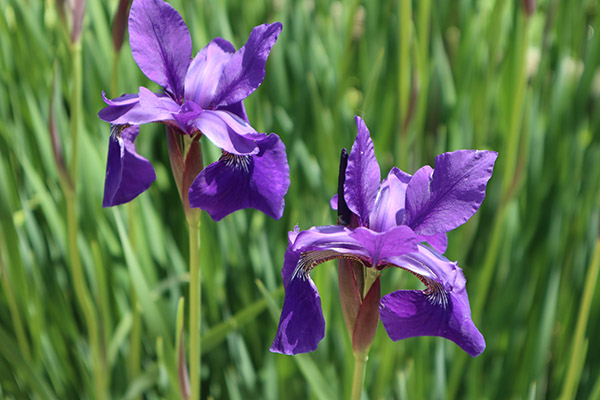

Siberian iris, Iris sibirica
How could you pick a favorite iris? There are thousands of iris varieties, and they come in just about every color. Still, we love the Siberian iris for its gorgeous blooms of blue and purple which are some of the rarest colors in flowers!
Soft Apricot Kisses peony, Paeonia hybrida ‘Soft Apricot Kisses’
Herbaceous peonies aren’t as tough as their woody relatives, but they’re still one of the hardiest perennials! They can live for over a century, and with their jaw dropping display, we’ll be happy if they stick around.
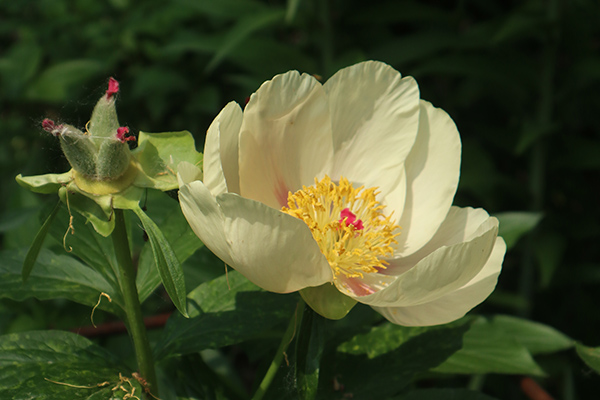

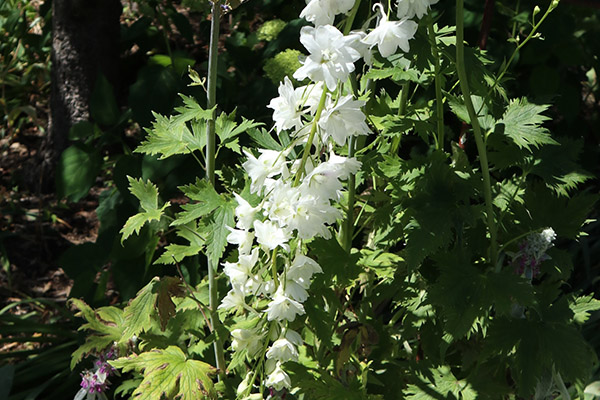

Round Table Mix Pacific Giants delphinium
Towering up to nine feet tall, delphinium adds a lot of height to the Garden. While it’s not easy to see the resemblance, their name comes from the Greek word for dolphin, referencing the resemblance of a new bud to a dolphin’s nose.
We would never dare to pick favorites, but in July, daylilies and lilies really steal the show. With their variety of colors and large blooms, the Daylily Display Garden is just about the best seat in the house.
Viburnums (peak), daylilies (peak), delphiniums (peak), lilies (peak), phlox (peak), roses (peak), hardy asters (peak), perennials (peak), annuals (peak)
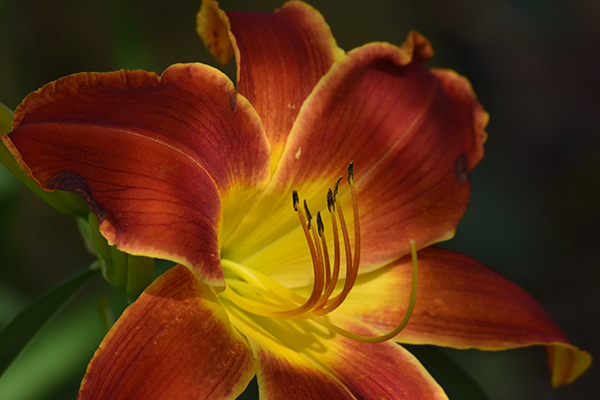

Topguns Eye Popper daylily, Hemerocallis ‘Topguns Eye Popper’
In July, the Daylily Display Garden overflows with flowers, so it’s hard to believe that each bloom only lasts for one day. Being in the genus Hemerocallis, they aren’t actually a true lily, but we love them just the same.
Painted Pixie Asiatic lily
True lilies are in the genus Lilium encompassing nine different categories around the globe. The stark contrast of the deep red and crisp white petals of the Painted Pixie Asiatic lily makes it particularly show stopping.
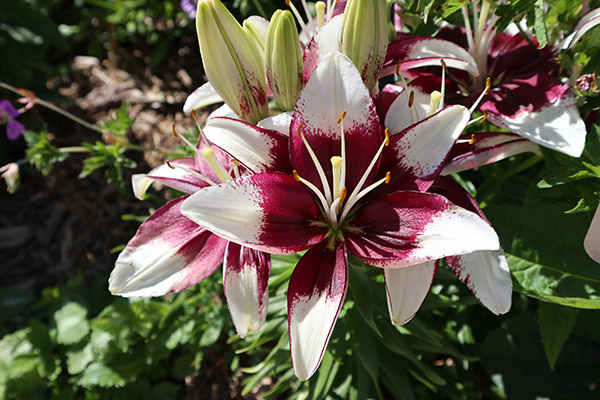

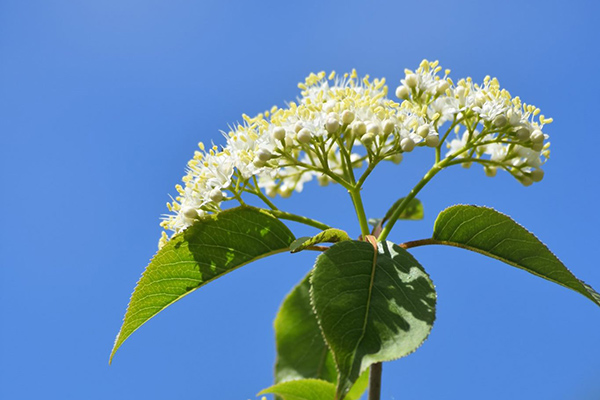

Forest Rouge® black haw viburnum, Viburnum prunifolium ‘McKRouge’
Viburnums have beautiful delicate blossoms; still, the show doesn’t stop after blooming season! Viburnums have shiny berries of yellow, orange, red, pink, blue, and sometimes even black. One of our favorites, the Forest Rouge® black haw viburnum, is named for its gorgeous burgundy and purple fall foliage.
It may be August, but the summer fun isn’t over yet! Some highlights this month include our later blooming daylilies, luscious phlox, and the start of hardy aster season.
Daylilies (peak), phlox (peak), roses, hardy asters (peak), chrysanthemums (peak), perennials (peak), annuals (peak)
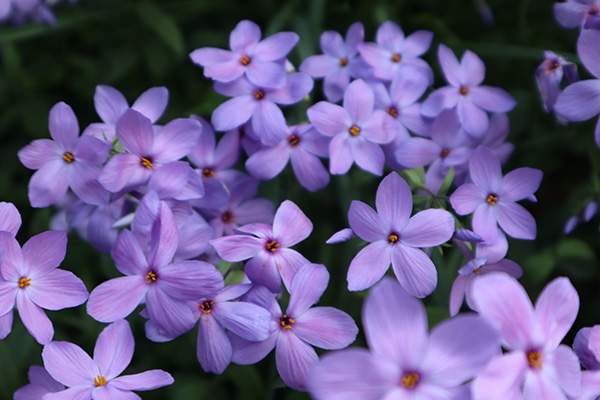

Sherwood Purple creeping phlox, Phlox stolonifera ‘Sherwood Purple’
Phlox is a summer staple in the Garden and a favorite of our resident butterflies. While most of us are familiar with the ground cover varieties, certain types can actually stretch up to five feet tall!
Velouette cosmos, Cosmos bipinnatus ‘Velouette’
With beautiful symmetry and their daisy-like shape, cosmos are a gorgeous selection for the Garden. With deep luscious red bordering swathes of white, the Velouette cosmo is a choice variety.
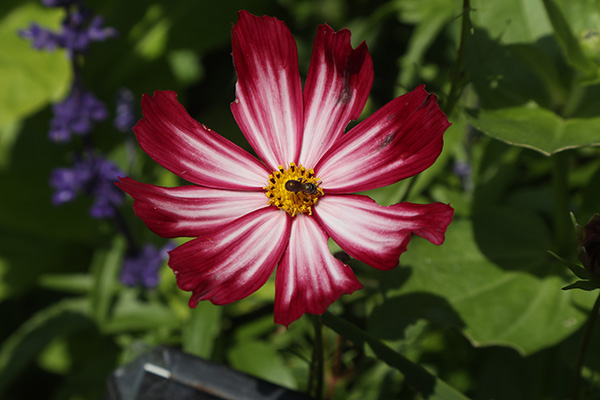

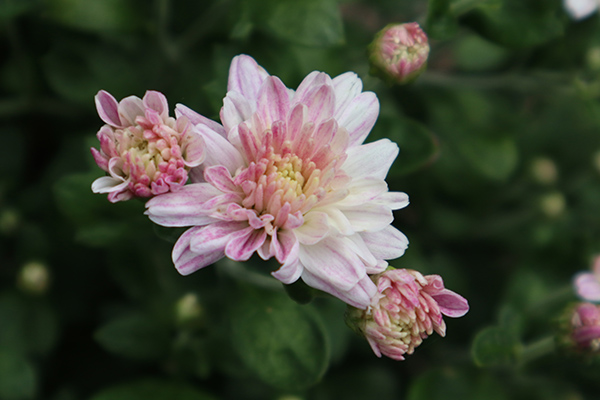

Frosty Igloo hardy garden mum, Dendranthema ‘Frosty Igloo’
Chrysanthemums are a part of the aster family, so it makes sense that they can handle a late summer chill. While cultivated varieties can have incredibly large blooms, more wild species are much smaller and hardier, perfect for Wisconsin!
As summer ends, the Garden celebrates the approaching autumn with show-stopping roses, hardy asters, darling mums, and more! It’s great time to visit, and the temperatures are perfect for a nice long walk.
Roses (peak), hardy asters (peak), chrysanthemums (peak), perennials, annuals
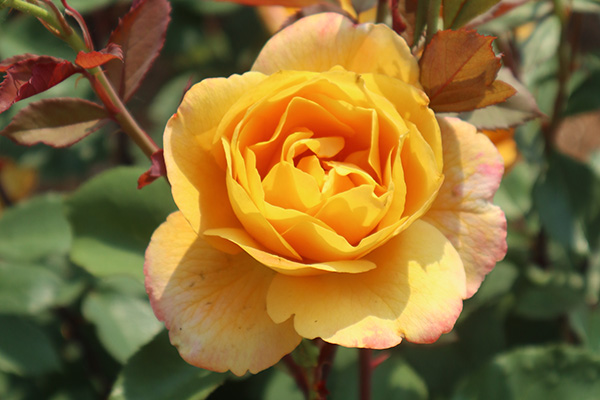

Strike It Rich grandiflora rose
Would you believe that all of our roses today come from fewer than 10 species? Since roses from all over the world hybridize easily, the possibilities are endless! You can find our selection in the Lux Foundation Rose Garden so stop by and smell the roses.
Neon sedum, Sedum spectabile ‘Neon’
In early fall, perennials bring a lot of color to the Garden. Neon sedum is no exception with radiant pink flowers that pop against green foliage. One of the most popular perennials, it’s low maintenance and hardy, a great choice for Wisconsin gardeners.
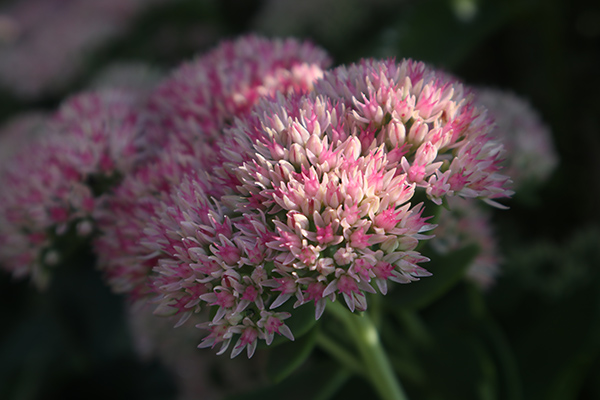

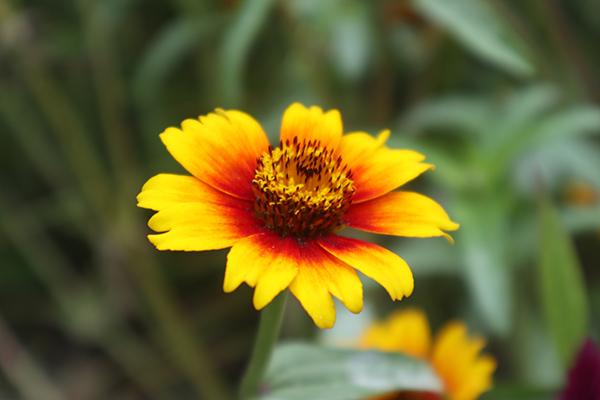

Persian Carpet Mexican zinnia, Zinnia haageana ‘Persian Carpet’
Zinnias originated in hot and dry parts of Mexico and Central America, and the Persian Carpet Mexican zinnia really brings the heat! With a fiery red-orange fading into stark yellow, they’re a standout in any yard and a favorite of pollinators.
As the breeze begins to catch a chill, our roses make a stunning encore in the Lux Foundation Rose Garden. Our hardier varieties also stick it out with hardy asters, annuals, and perennials taking center stage.
Roses, hardy asters (peak), perennials, annuals
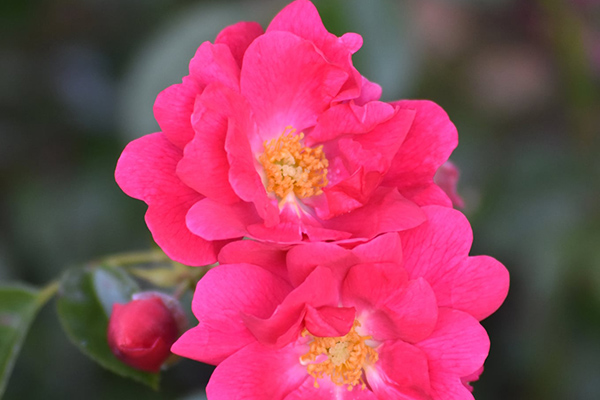

All the Rage Easy Elegance® shrub rose, Rosa EASY ELEGANCE ‘BAIrage’
Roses are the dinosaur of flowers – really! From fossil records we know that roses are one of the most ancient flowers, and we’ve already been cultivating them for around 5,000 years. Still, there’s nothing prehistoric about the neon pink blooms of the All the Rage Easy Elegance® shrub rose, a staple in the Lux Foundation Rose Garden.
false autumn crocus, Colchicum autumnale
Not a true crocus, false autumn crocuses bring a touch of purple to contrast the oranges, reds, and yellows of changing leaves. In fact, the false autumn crocus has no leaves at all when they first bloom!
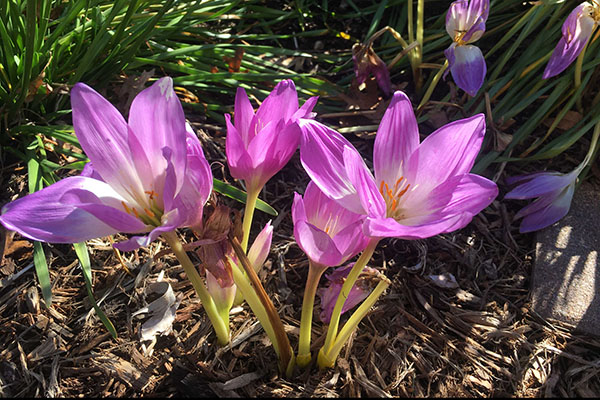

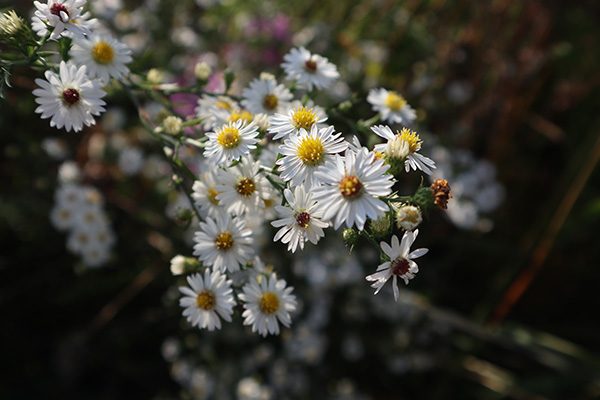

white prairie aster, Symphyotrichum falcatum
Aster means star in Greek, a name given to them because of their small dainty blooms. While they seem fragile, looks can be deceiving! They’re one of the last flowers to stick it out as the winter cold encroaches.
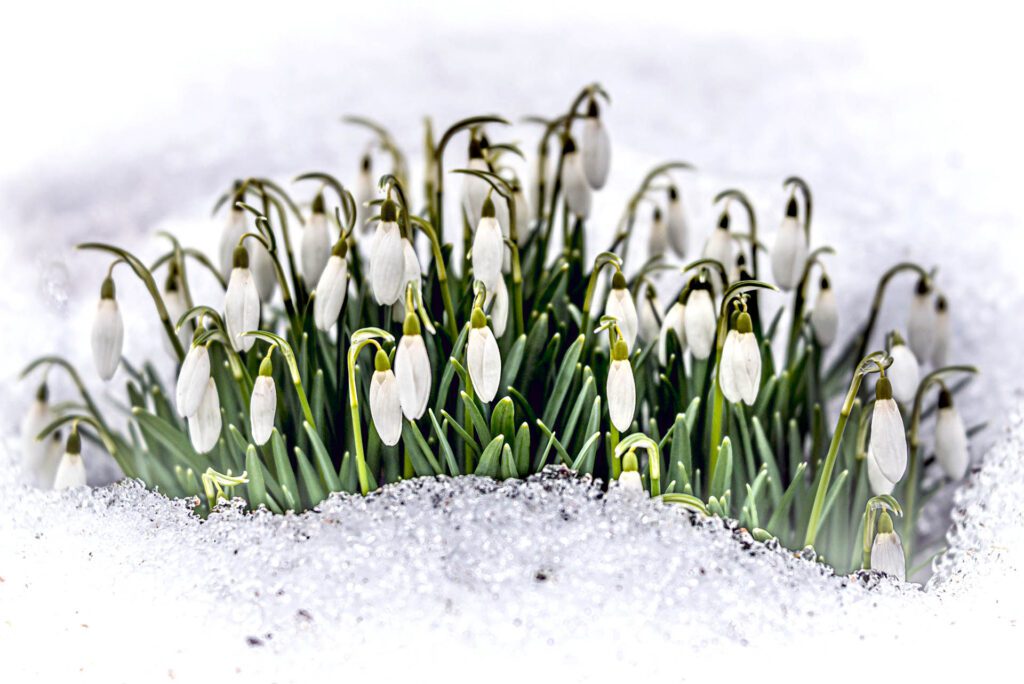

The arrival of winter provides much needed hibernation for our beloved blooms. Through the colder months, the Garden is a serene winter wonderland of draping snow, spikey evergreens and conifers, and other remnants of warmer seasons. Still, our flowers will be back in no time, and we hope you’ll be there to give them a warm spring greeting.
Spring Bulbs
Magnolias (peak)
Daffodils (peak)
Spring Bulbs (peak)
Magnolias (peak)
Daffodils (peak)
Tulips (peak)
Viburnums (peak)
Crabapples (peak)
Lilacs (peak)
Hawthorns (peak)
Tree Peonies (peak)
Perennials
Annuals
Spring Bulbs
Viburnums (peak)
Crabapples
Lilacs (peak)
Hawthorns (peak)
Tree Peonies (peak)
Irises (peak)
Herbaceous Peonies (peak)
Delphiniums (peak)
Lilies (peak)
Phlox (peak)
Roses (peak)
Perennials (peak)
Annuals (peak)
Viburnums (peak)
Daylilies (peak)
Delphiniums (peak)
Lilies (peak)
Phlox (peak)
Hardy Asters (peak)
Roses (peak)
Perennials (peak)
Annuals (peak)
Daylilies (peak)
Phlox (peak)
Hardy Asters (peak)
Chrysanthemums (peak)
Roses
Perennials (peak)
Annuals (peak)
Hardy Asters (peak)
Chrysanthemums (peak)
Roses (peak)
Perennials
Annuals
Hardy Asters (peak)
Roses
Perennials
Annuals
Perennials
Annuals
Winter in Wisconsin means hibernation time for many of our perennials. Return in spring for more flower power or plan a trip to the Garden for some time outdoors in a beautiful winter wonderland with snow-covered gazebos, spikey evergreens and conifers, and other over-wintering bits of nature.
920.490.9457
info@gbbg.org
2600 Larsen Rd
Green Bay, WI 54303
Be the first to know about our latest news, upcoming events, programs, and more.
©2024 Green Bay Botanical Garden. All Rights Reserved.


Save $10 with the code NEW2024
Join by June 3, 2024
A donation to the Garden by Dec 31 makes a world of difference. Be part of our growth journey! 🌺
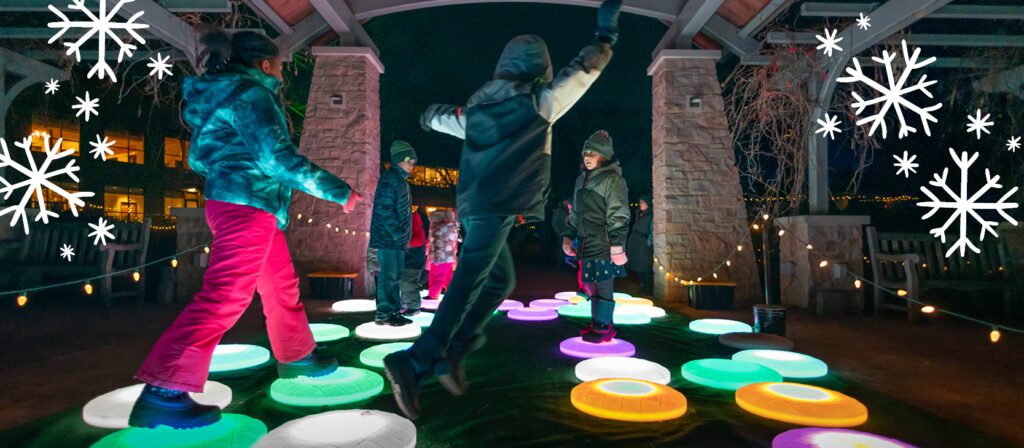

A Garden membership is a meaningful gift for your loved ones to enjoy this timeless treasure and make memories all year long.
Support the Garden and gift a membership today!
Explore nature’s wonders!
Join as a new member by December 3 and receive two Free Daily Admission Passes.


View and bid on hundreds of items like plant containers and hanging baskets, gift packages, outdoor living items, and so much more.
will be moved indoors with limited seating due to Friday’s weather forecast. Tickets are no longer available. We apologize for any inconvenience!
Our ticketing system is currently down. Call our Guest Experience Team at 920.490.9547 to purchase event tickets or online daily admission. We apologize for any inconvenience!